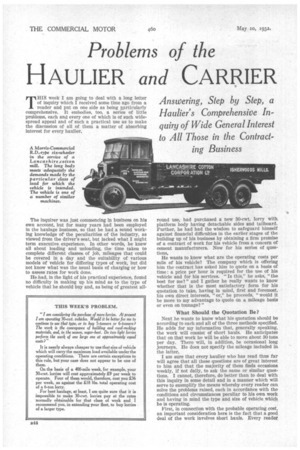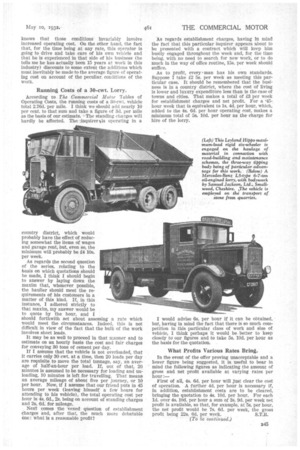Problems of the
Page 58

Page 59

If you've noticed an error in this article please click here to report it so we can fix it.
HAULIER and CARRIER
Answering, Step by Step, a Haulier's Comprehensive In quiry of Wide General Interest to All Those in the Contract ing Business
THIS week I am going to deal with a long letter of inquiry which I received some time ago from a reader and put on one side as being Larticularly comprehensive. It embodies, too, a series of little problems, each and every one of which is of such widespread appeal and of such a practical use as to make the discussion of all of them a matter of absorbing interest for every haulier.
The inquirer was just commencing in business on his own account, but for many years had been employed in the haulage business, so that he had a sound working knowledge of' the peculiarities of the industry, as viewed from the driver's seat, but lacked what I might term executive experience. In other words, he knew all about loading and unloading, the time taken to complete different classes of job, mileages that could be covered in a day and the suitability of various models of vehicle for differing types of work, but did not know what was the usual basis of charging or how to assess rates for work done.
He had, in the light of his practical experience, found no difficulty in making up his mind as to the type of vehicle that he should buy and, as being of greatest all round use, had purchased a new 30-cwt. lorry with platform body having detachable sides and tailboard. Further, he had had the wisdom to safeguard himself against financial difficulties in the earlier stages of the budding up of his business by obtaining a firm promise of a contract of work for his vehicle from a concern of cement manufacturers. Now for his series of questions.
He wants to know what are the operating costs per mile of his vehicle? The company which is offering him the contract has asked him to quote on a basis of time: a price per hour is required for the use of his vehicle and for his services. "Is this," he asks, 'the best for me?" and I gather he really wants to know whether that is the most satisfactory form for his quotation to take, having in mind, first and foremost, his own direct interests, "Or," he proceeds, "would it be more to my advantage to quote on a mileage basis or even on tonnage?"
What Should the Quotation Be?
Next he wants to know what his quotation should be according to each and all of the three methods specified. Ile adds for my information that, generally speaking, the work will consist of short hauls. He anticipates that on that work he will be able to move about 30 tons per day. There will, in addition, be occasional long journeys. He does not specify the mileage included in the latter.
I am sure that every haulier who has read thus far will agree that all these questions are of great interest to him and that the majority of them finds occasions weekly, if not daily, to ask the same or similar questions. I cannot, therefore, do better than to deal with this inquiry in some detail and in a manner which will serve to exemplify the means whereby every reader can solve the problems raised, each in accordance with the conditions and circumstances peculiar to his own work and having in mind the type and size of vehicle which he is operating.
First, in connection with the probable operating cost, an important consideration here is the fact that a good deal of the work involves short hauls. Every reader knows that those conditions invariably involve increased operating cost. On the other hand, the fact that, for the time being at any rate, this operator is going to drive and take care of his own vehicle and that he is experienced in that side of his business (he tells me he has actually been 15 years at work in this industry) discounts to some extent the additions which must inevitably be made to the average figure of operating cost on account of the peculiar_ conditions of the work.
Running Costs of a 30-cwt. Lorry.
According to The Commercial Motor Tables of Operating Costs, the running costs of a 30-cwt. vehicle total 2.76d. per mile. I think we should add nearly 10 per cent. to that sum and take a figure of 3d. per mile as the basis of our estimate. The standing charges will hardly be affected. The inquirer is operating in a
country district, which would probably have the effect of reducing somewhat the items of wages and garage rent, but, even so, the minimum will probably be £4 10s. per week.
As regards the second question of the series, relating to the basis on which quotations should be made, I think I should begin to answer by laying down the maxim that, whenever possible, the haulier should meet the requirements of his customers in a matter of this kind. If, in this Instance, I adhered strictly to that maxim, my answer would be to quote by the hour, and I should forthwith set about assessing a rate which would meet the circumstances. Indeed, this is not difficult in view of the fact that the bulk of the work involves short leads.
It may be as well to proceed in that manner and to estimate on an hourly basis the cost and fair charges for conveying 30 tons of cement per day.•If I assume that the vehicle is not overloaded, that it carries only 80 cwt. at a time, then 20 loads per day are requisite to move the total tonnage, say, an average of half-an-hour per load. If, out of that, 20 minutes is assumed to be necessary for loading and unloading, 10 minutes is left for travelling. That means an average mileage of about five per journey, or 10 per hour. Now, if I assume that our friend puts in 45 hours per week (leaving himself a few hours for attending to his vehicle), the total operating cost per hour is 4s. 6d., 2s. being on account of standing charges and 2s. 6d. for mileage. Next comes the 'vexed question of establishment .Charges and, after that, the much more debatable one: What is a reasonable profit? As regards establishment charges, having in mind the fact that this particular inquirer appears about to be presented with a contract which will keep him busily engaged throughout the week and, for the time being, with no need to search for new work, or to do much in the way of office routine, 15s. per week should suffice.
As to profit, every man has his own standards. Suppose I take £2 5s. per week as meeting this particular case. It should be remembered that the busines,s is in a country district, where the cost of living is lower and luxury expenditure less than is the case of towns and cities. That makes a total of 13 per week for establishment charges and net profit. For a h45hour week that is equivalent to is. 4d. per hour, which, added to the 4s. 6d. per hour operating cost, makes a minimum total of 5s. 10d. per hour as the charge for hire of the lorry.
I would advise 6s. per hour if it can be obtained, but, having in mind the fart that there is so much -competition in this particular class of work and size of vehicle, I think perhaps it would be better to keep closely to opr figures and to take 5s. 10d. per hour as the basis for the quotation.
What Profits Various Rates Bring.
In the event of the offer proving unacceptable and a lower figure being suggested, it is useful to bear in mind the following figures as indicating the amount of gross and. net profit available at varying rates per hour : First of all, 4s. 6d. per hour will just clear the cost of operation. A further 4d. per hour is necessary if, in addition, establishment costs are to be cleared, bringing the quotation to 4s. 10d. per hour. For each 1d. over 4s. 10d. per liour a sum of 3s. M. per week net profit is available, so that, for example, at 5s. per hour, the net profit would be 7s. 6d. per week, the gross profit being 22s. 6d. per week.




























































































